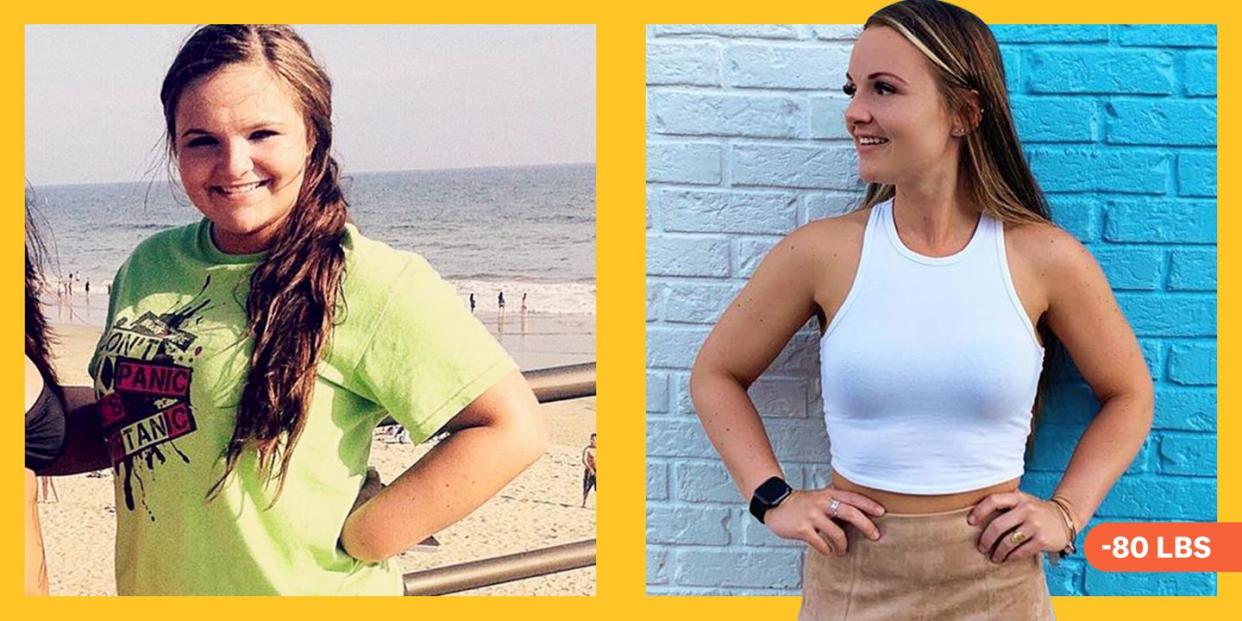'Counting My Macros Was The Game Changer I Needed On My Weight-Loss Journey—And I've Lost 80 Pounds'

My name is Regan Patterson (@regan_patterson) and I'm a 27-year-old personal trainer living in Orlando, Florida. After years of being overweight, at 222 pounds, I decided to switch to a low-carb diet and hit the gym. I ended up losing a total of 80 pounds.
I was active in high school and played multiple sports, so I was always in shape. But when I went to college, I stopped playing sports and my activity level went wayyy down. My food choices changed and I began eating out of convenience (hello, fast food).
In a few years, I noticed my body had completely changed—and I decided I needed to do something different. So I started out by following a low-carb diet and lost 40 pounds. But I quickly gained it all back and more. I found myself back at square one with even more weight to lose. I felt so discouraged and didn’t do anything about it for a couple years.
Eventually, I knew that I couldn't keep going on like that. At 222 pounds, I finally decided I was going to start my diet again and not stop until I got to where I wanted to be.
A post shared by Regan Patterson (@regan_patterson) on Nov 7, 2019 at 5:56am PST
Nutrition became my number one priority.
The first thing I did was turn towards healthier foods, adopting a low-carb diet. But this time I made sure to really fuel myself with fruits, veggies, and lean protein sources. I also started eating out less and cut out liquid calories, which I know helped tremendously.
Eventually I began counting macros. Macro counting involves tracking your caloric intake. I made sure to get enough protein and also monitored my carb and fat intake too. It taught me a lot about food and having a balanced diet.
A post shared by Regan Patterson (@regan_patterson) on Dec 18, 2018 at 3:30pm PST
My meal plan is low-carb of course, but I change up what I eat every day.
Even though I adopted a low-carb diet, I knew that I needed to have variety to stay on track. That's why every day looks different when it comes to what I eat. Here's a sample day:
Breakfast: I usually skip breakfast because I don’t get hungry until lunch time.
Lunch: I’ll have a sandwich with some fruits or veggies, and maybe a protein shake.
Dinner: This is usually where I get more creative and make recipes of my favorite meals like burgers and tacos by using leaner meats and lower carb buns or tortillas so that they fit my macros. Other times, I'll go simple with some grilled chicken, veggies, and potatoes.
Snacks: I always make room for a treat at the end of the day, whether that's some Halo Top ice cream or another one of my fave snacks. It's important to give myself the flexibility to enjoy foods I love. It’s easier to stay on track when I don’t feel deprived.
A post shared by Regan Patterson (@regan_patterson) on Apr 22, 2019 at 12:37pm PDT
When it came to working out again, I started out with something small.
I knew that I couldn't just jump back into my old college workouts. So I started out by taking daily walks and hitting the gym a couple days a week. Once I got comfortable in the gym again, I started strength training and fell in love with it.
Lifting weights has become a main form of exercise for me now, which is actually really important when it comes to fat loss. Eventually I worked my way up in the gym from a couple days a week to five to six days a week. I went from 222 pounds to 142 pounds. That's an 80-pound weight loss.
A post shared by Regan Patterson (@regan_patterson) on Nov 27, 2019 at 10:29am PST
But it's not always easy for me to stay motivated.
Now, I'm a personal trainer, and I try to be super transparent about my weight-loss journey. When people ask me how I managed to stay motivated and how they can do the same, I tell my clients, "I don't." The truth is, you will not always be motivated—and that's okay.
Feeling unmotivated is a feeling that comes and goes. But being dedicated means you do it anyway, especially when it's hard. That’s why it’s so important to create habits; you'll do them even when you don’t feel like it because they become second nature.
A post shared by Regan Patterson (@regan_patterson) on Nov 29, 2019 at 12:10pm PST
My process was very gradual—and yours can be too.
A post shared by Regan Patterson (@regan_patterson) on Oct 20, 2019 at 1:12pm PDT
It took me two years to lose those 80 pounds, and I think it's so important people understand that weight loss takes time. You have to be patient. Giving up won’t get you any closer to your goals, so you just have to flex your patience muscle and keep going.
I also tell my clients to find a form of exercise that they really love—something they can always go to when they're not sure what to do. If you like lifting weights, do it. If you like running, do it. If you don’t enjoy it, you won’t stick to it. Sustainability is key. You want to keep the weight off forever, not just a temporary fix.
My last tip for others trying to lose weight: Consistency will always beat perfection. So don't be so hard on yourself if the workouts are hard or you can't run as long as you used to. Dust yourself off and keep going.
A post shared by Regan Patterson (@regan_patterson) on Oct 14, 2019 at 4:17pm PDT
You Might Also Like
